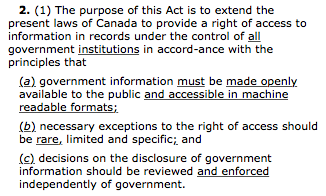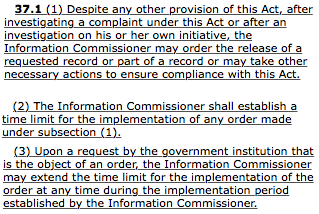
Relatively little attention was paid to the recent Parliamentary vote on Bill C-613, An Act to amend the Parliament of Canada Act and the Access to Information Act. The bill was introduced to the House of Commons as a private member's bill by Justin Trudeau on June 11, 2014. The bill had a two-pronged approach to increasing government transparency as follows:
1.) requiring the Board of Internal Economy to open its meetings to the public
2.) amending the Access to Information Act to modernize and clarify the purpose of the Act and to give the Information Commissioner the power to make compliance orders.
For those of you that are not aware, the highly secretive Board of Internal Economy is an all-party committee, chaired by the Speaker of the House, that is responsible for overseeing all House of Commons spending and other business. Here is a list of the current members in which the Conservative Party members hold four of the seven seats:
The Board establishes the policies and guidelines that relate to expenditures and other resources accessible to MPs and Senators. In the interest of "openness", the Board posts theminutes of its meetings on the Parliament of Canada website, however, these minutes are frustratingly scant on details of what actually took place and who said what during the meeting. Here is an example:
As for the changes proposed to the Access to Information Act (ATIA), the original act came into effect in 1983 and recognizes the rights of all Canadians to obtain information from government institutions. The law created a new authority, the Information Commissioner, who would investigate complains about non-compliance with the law's requirements. At that time, Canada was on the vanguard of an international movement toward government openness with only five other countries having similar laws in place in 1982. While it was put in place with the best intentions, the passage of time suggests that government officials have become adept at developing strategies that blunt the opportunities for openness that the law creates, in particular, the failure of the law to include many key federal institutions. In her most recent annual report, Information Commissioner Suzanne Legault notes that there has been a
"…steady erosion of information rights in Canada over the past 30 years and…has become a shield against transparency and has encouraged a culture of delay…"
As it stands, the Act requires institutions to respond to an access request within 30 days. If a request will take longer to fulfill, the Act requires the institution involved to notify the Information Commissioner. In 2002 – 2003, 69 percent of requests were responded to within 30 days, by 2011 – 2012, this had dropped to 55 percent. In 2002 – 2003, 55 percent of extensions were for more than 30 days. This rose to 79 percent in 2013 – 2014. These delays prevent timely responses by the public and other interested parties to government policies and actions.
After that background, let's go back to the subject of this posting. Here is a link to the entire text of Bill C-613.
Here is an excerpt regarding the meetings held by the Board of Internal Economy:
Here is an excerpt regarding the Access to Information Act:
Let's look at what John Carmichael of the Conservative Party had to say about Bill C-613:
"Mr. Speaker, I rise today to voice my concerns about Bill C-613, an act to amend the Parliament of Canada Act and the Access to Information Act, on transparency. I would like to focus specifically on the part of the bill that deals with the Access to Information Act.
As members know, this part of the bill proposes to change some of the wording in the “Purpose” section of the act to state that:
(a) government information must be made openly available to the public and accessible in machine readable formats;
(b) necessary exceptions to the right of access should be rare, limited and specific; and
(c) decisions on the disclosure of government information should be reviewed and enforced independently of government.
These amendments may seem to be only a few words on the page but their effect on the access to information system, and the infrastructure and resources set up to administer it, are far-reaching and costly.
Further, we object to the bill because these changes that it proposes are not necessary in light of existing practices under the act. In fact, they would overburden the administration of Canada's access to information regime. Indeed, they would lead to increased cost pressures and delays in responding to information requesters.
The bill would also give the Information Commissioner order-making powers under the act. Once again, this is unnecessary. The Information Commissioner already has the strong mandate needed to investigate and resolve disputes concerning access to information requests.
However, while we do not support this bill, let there be no mistake about this government's commitment to transparency, accountability and getting government information into the hands of Canadians. Indeed, Canadians are accessing more government information now than ever before, and the government is more open and transparent today than it has ever been. We understand that government information and data can enhance the transparency and accountability of our public institutions, and spur economic activity. We are committed to strengthening and modernizing our access to information and privacy program. We have already accomplished a great deal in this respect."
Apparently, even though it was released the day before his part in the debate, Mr. Carmichael spent very little time looking at the statistics provided by the Information Commissioner that quite clearly show that the current government is quite adept at using stalling tactics to prevent Canadians from finding out about the inner workings of the Harper government in something approaching a reasonable timeframe.
As well, Mr. Carmichael states that the government posts summaries of completed access to information requests on theTreasury Board website which it does on a monthly basis. Let's look at some one month as an example. During the month of February 2015, there were 22 Access to Information requests completed. Of the 22, only 4 or 18.2 percent were disclosed in full, 17 or 77.3 percent were disclosed in part and one showed that no records existed. As for the "disclosed in part" requests, we have absolutely no idea how much information was deliberately held back by the government for such requests as the monetary disbursements made to employees who stopped working after the Government of Canada job cuts between 2009 and 2014 and the emails and texts sent or received by the Secretary of the Treasury Board related to the shooting at the War Memorial and Centre Block on Parliament Hill in October 2014.
Bill C-613 was defeated at its second reading on April 1, 2015. Here's a list of who voted against the Bill which resulted in it being defeated 139 to 122:
So, when you hear this about "open data" from the Harper government…
…their voting record on Bill C-613 tells you just how committed they are to government openness and transparency.
Click HERE to read more of Glen Asher's columns
You can publish this article on your website as long as you provide a link back to this page.






Be the first to comment